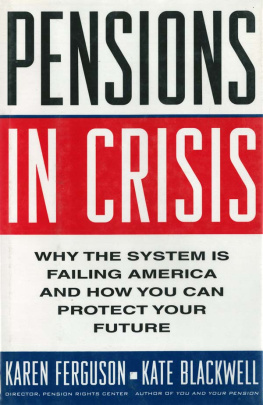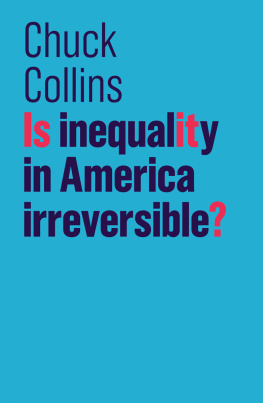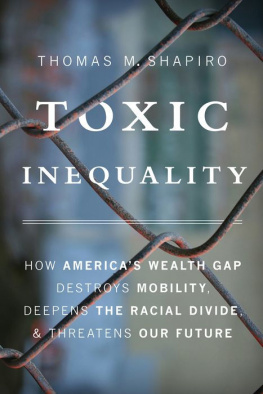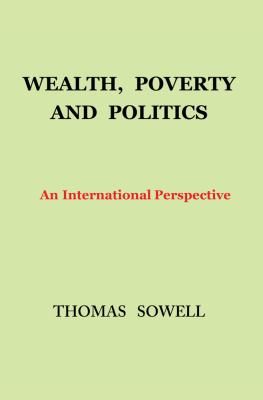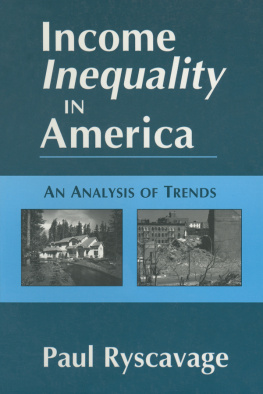Karen Petrou - Engine of Inequality: The Fed and the Future of Wealth in America
Here you can read online Karen Petrou - Engine of Inequality: The Fed and the Future of Wealth in America full text of the book (entire story) in english for free. Download pdf and epub, get meaning, cover and reviews about this ebook. year: 2021, genre: Politics. Description of the work, (preface) as well as reviews are available. Best literature library LitArk.com created for fans of good reading and offers a wide selection of genres:
Romance novel
Science fiction
Adventure
Detective
Science
History
Home and family
Prose
Art
Politics
Computer
Non-fiction
Religion
Business
Children
Humor
Choose a favorite category and find really read worthwhile books. Enjoy immersion in the world of imagination, feel the emotions of the characters or learn something new for yourself, make an fascinating discovery.

- Book:Engine of Inequality: The Fed and the Future of Wealth in America
- Author:
- Genre:
- Year:2021
- Rating:5 / 5
- Favourites:Add to favourites
- Your mark:
- 100
- 1
- 2
- 3
- 4
- 5
Engine of Inequality: The Fed and the Future of Wealth in America: summary, description and annotation
We offer to read an annotation, description, summary or preface (depends on what the author of the book "Engine of Inequality: The Fed and the Future of Wealth in America" wrote himself). If you haven't found the necessary information about the book — write in the comments, we will try to find it.
Karen Petrou: author's other books
Who wrote Engine of Inequality: The Fed and the Future of Wealth in America? Find out the surname, the name of the author of the book and a list of all author's works by series.
Engine of Inequality: The Fed and the Future of Wealth in America — read online for free the complete book (whole text) full work
Below is the text of the book, divided by pages. System saving the place of the last page read, allows you to conveniently read the book "Engine of Inequality: The Fed and the Future of Wealth in America" online for free, without having to search again every time where you left off. Put a bookmark, and you can go to the page where you finished reading at any time.
Font size:
Interval:
Bookmark:
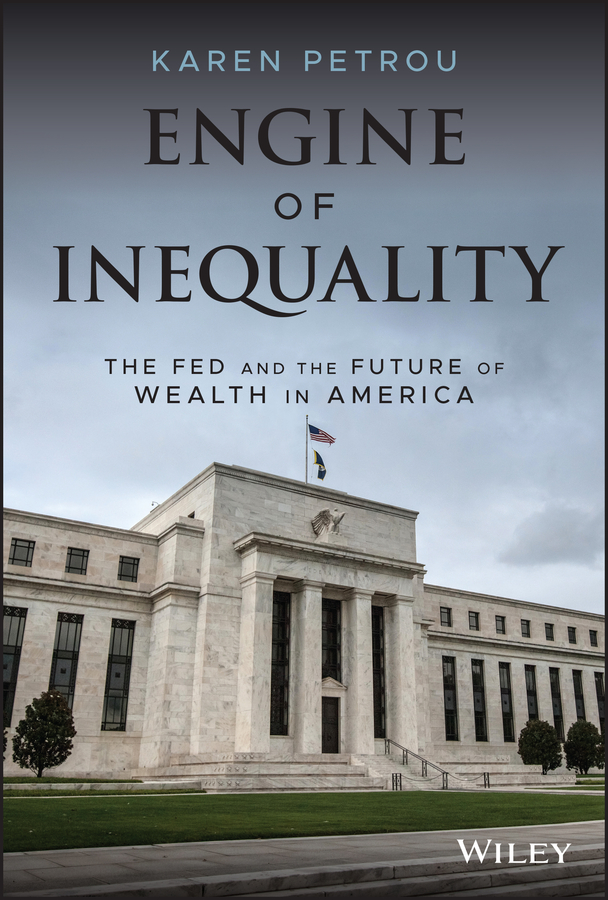
- Chapter 7
- Chapter 10
- Chapter 11
- Chapter 2
- Chapter 3
- Chapter 6
- Chapter 8
Karen Petrou

Copyright 2021 by Karen Petrou. All rights reserved.
Published by John Wiley & Sons, Inc., Hoboken, New Jersey.
Published simultaneously in Canada.
No part of this publication may be reproduced, stored in a retrieval system, or transmitted in any form or by any means, electronic, mechanical, photocopying, recording, scanning, or otherwise, except as permitted under Section 107 or 108 of the 1976 United States Copyright Act, without either the prior written permission of the Publisher, or authorization through payment of the appropriate per-copy fee to the Copyright Clearance Center, Inc., 222 Rosewood Drive, Danvers, MA 01923, (978) 750-8400, fax (978) 646-8600, or on the Web at www.copyright.com. Requests to the Publisher for permission should be addressed to the Permissions Department, John Wiley & Sons, Inc., 111 River Street, Hoboken, NJ 07030, (201) 748-6011, fax (201) 748-6008, or online at www.wiley.com/go/permissions.
Limit of Liability/Disclaimer of Warranty: While the publisher and author have used their best efforts in preparing this book, they make no representations or warranties with respect to the accuracy or completeness of the contents of this book and specifically disclaim any implied warranties of merchantability or fitness for a particular purpose. No warranty may be created or extended by sales representatives or written sales materials. The advice and strategies contained herein may not be suitable for your situation. You should consult with a professional where appropriate. Neither the publisher nor author shall be liable for any loss of profit or any other commercial damages, including but not limited to special, incidental, consequential, or other damages.
For general information on our other products and services or for technical support, please contact our Customer Care Department within the United States at (800) 762-2974, outside the United States at (317) 572-3993 or fax (317) 572-4002.
Wiley also publishes its books in a variety of electronic formats. Some content that appears in print may not be available in electronic books. For more information about Wiley products, visit our web site at www.wiley.com.
Library of Congress Cataloging-in-Publication Data is Available
ISBN 9781119726746 (Hardcover)
ISBN 9781119727538 (ePDF)
ISBN 9781119730057 (ePub)
Cover Design: Wiley
Cover Image: P_Wei/Getty Images
Author Photo: courtesy of the Author
To Basil, whose tireless patience, encouragement, and critical rereading made this book possible along with so much more.
Grateful thanks are extended to Matthew Shaw, whose research helped to ensure that this book is as right as we can make it, and to Arezou Rafikian for her never-ending cheerful willingness to clean up all my typos. Space does not permit thanks also to the many bankers, policy-makers, industry critics, and friends who have read portions of the manuscript and provided both encouragement to be sure this story is told and constructive comments to make sure it's told correctly. Appreciation also to Leah Spiro, my bulldog agent; Bill Falloon, a very helpful editor; Ellen Kadin, who framed key parts of the initial proposal; Barbara Hendricks; and Mark Fortier and his crack advisory team. Finally, a pat on the head for Zuni, my German Shepherd guide dog. Her unflagging and enthusiastic presence got me to and from many meetings, speeches, and drinks with friends that honed my thinking.
Dubbed by the American Banker the sharpest mind analyzing banking policy today maybe ever, Karen Petrou is one of the most sought-after financial consultants in Washington and one of the most influential experts on financial policy and regulation in the world. She is Managing Partner of Federal Financial Analytics, the Washington, DC, financial services consulting firm she co-founded in 1985. It does not lobby for anyone, providing strategic and policy analysis and advisory services to major financial institutions and global central banks. Her views can be found almost every day in the Financial Times, American Banker, Wall Street Journal, NPR, CNBC, and many other media. In addition to testifying before the US Congress, she has spoken before the Federal Reserve Banks of New York, St. Louis, San Francisco, and Chicago; the European Central Bank; the International Monetary Fund; and many other governmental, industry, and academic groups. She also provides strategic guidance to foundations on a pro bono basis in connection with work by her and her husband, Basil, to create new funding instruments to speed biomedical research. Winners of the Visionary Award in 2019 from the Foundation Fighting Blindness for this work, the Petrous live in Washington, DC, with Zuni, a German Shepherd guide dog.
In 2008, the financial system collapsed suddenly and, to many regulators and central bankers, seemingly without warning. The great financial crisis that ensued wrought havoc, but by 2010 the financial system stabilized and stock markets began their upward climb. By 2013, the Federal Reserve was confident that the Great Recession that followed the great financial crisis had ended, with financial markets also well on their way to becoming bulletproof thanks to tough new banking rules. The US central bank thus proclaimed that all was right with the national economy and financial system even though only a tiny percentage of Americans benefit from rising financial markets, underemployment was endemic, and anyone who tried to save his or her way to a better life lost ground every day due to ultra-low interest rates.
The Obama Administration also congratulated itself on the sound economy and resilient financial system, Hillary Clinton campaigned on renewed prosperity, Americans knew more than economists about their own struggles, Donald Trump won, markets climbed higher, economic growth remained weak, and America grew ever angrier as economic inequality rose even higher. By 2020, COVID blew away every one of the foundations on which the Fed thought the economy and financial system so securely rested. A decade of rising financial markets atop acute economic and racial inequality made the US as vulnerable to an economic shock as an ill-kempt nursing home to the coronavirus.
I'm among the Americans who got angrier and angrier from 2010 to 2020 as America became increasingly unequal while well-intentioned policy-makers assured us that, as the Fed likes to say, the US economy was in a good place. In my day job, I analyze monetary and regulatory policy to assess its strategic impact on financial-services companies and markets, doing so for major corporations, central banks, and those elsewhere in the financial market who make or lose money based on what policy-makers do. This isn't exactly a job in the inequality trenches, but it does afford a unique perspective on the totally perverse effect of post-2008 financial policy: acute inequality and resulting risks to both growth and financial stability.
As the 2016 campaign began, I also saw another consequence of post-crisis financial policy: voter fury about the deaf ear most financial decision-makers gave to the warp-speed disintegration of the American middle class, economic despair in communities of color, and profound distrust across what was once the US's manufacturing and agricultural heartland. Calls resonated for policies founded on populism, nativism, and even racism calls that turned out to be clarion to all too many because vast swaths of the US were in acute economic distress no matter the aggregate growth and employment numbers with which the Federal Reserve comforted itself.
Next pageFont size:
Interval:
Bookmark:
Similar books «Engine of Inequality: The Fed and the Future of Wealth in America»
Look at similar books to Engine of Inequality: The Fed and the Future of Wealth in America. We have selected literature similar in name and meaning in the hope of providing readers with more options to find new, interesting, not yet read works.
Discussion, reviews of the book Engine of Inequality: The Fed and the Future of Wealth in America and just readers' own opinions. Leave your comments, write what you think about the work, its meaning or the main characters. Specify what exactly you liked and what you didn't like, and why you think so.


